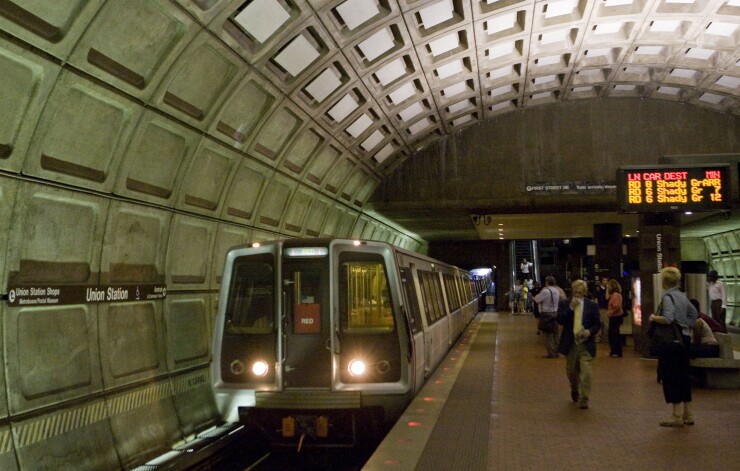Strong government support fueled a two-notch upgrade for the Washington D.C.’s mass transit system despite drops in ridership.
Moody’s Investors Service upgraded the Washington Metropolitan Area Transit Authority’s gross transit revenue bonds two notches to Aa3 from A2 citing financial commitments from the District of Columbia and Maryland and Virginia. The upgrade, which puts the WMATA on par with an AA-minus mark from S&P Global Ratings, affects about $65 million of debt outstanding. The credit outlook was revised to stable from positive.

“Subsidies from WMATA's governmental partners make up a growing share of its revenue and the steady governmental support mitigates challenges posed by the authority's negative ridership trend,” Moody’s analyst Matthew Butler wrote in a June 17 report. “The stable outlook reflects the strong financial support from the authority's state and local partners and the expectation that addressing outstanding capital needs will not place a substantial burden on WMATA's resources."
The WMATA saw rail ridership fall just over 7% in 2016 and 2017, according to Moody’s. The authority’s rail ridership dipped just under 1% for 2018, but it saw a 9% drop in bus passengers. An amended 2019 fiscal year budget assumes a 1.4% drop in rail ridership and 0.3% for bus ridership.
Butler noted that D.C., Maryland and Virginia all have shown commitments to supporting WMATA operations. The operating subsidy from WMATA's state and local partners grew an average of 8% annually from 2012 to 2018 and an amended 2019 budget increases it 13.5%. Legislation approved by the three governments in 2018 dedicates additional funds to the WMATA which will begin with an annual combined contribution of $500 million starting in the 2020 fiscal year.
The upgrade also reflects improved internal liquidity, continued bank support through lines of credit and greater certainty with grant funding following the Federal Transit Administration’s recent approval of the Washington Metrorail Safety Commission's Safety Oversight Program, according to Butler. A key credit challenge, however is unfunded pension and other post-employment benefits that are high relative to the WMATA’s revenues, Butler said.
The WMATA's gross transit revenue bonds are secured by gross revenues that largely consists of passenger fares and operating subsidies from participating state and local jurisdictions. The agency operates the nation’s second largest heavy rail system and sixth largest bus system. It serves a Washington, D.C. metropolitan area that has a population of about 6.2 million.





